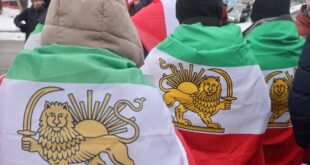 Ali Shakeri, an Iranian-American national who was arrested on May 8, was released on a bail of approximately USD 100,000 Monday night. An informed source from the Judiciary spokesman’s office told FNA that Shakeri, who is charged with security crimes has been released on bail, but is not yet allowed to leave the country.
Ali Shakeri, an Iranian-American national who was arrested on May 8, was released on a bail of approximately USD 100,000 Monday night. An informed source from the Judiciary spokesman’s office told FNA that Shakeri, who is charged with security crimes has been released on bail, but is not yet allowed to leave the country.
“In case he is willing to leave the country, Shakeri should file a request to the interrogator of his dossier,” the source said, adding that the interrogator is the only one who can decide about Shakeri’s travel to abroad.
Previously, it had been assumed that Shakeri, a California-based businessman who is also a board member of a private conflict-resolution group, was being held on charges of harming national security and in relation to other Iranian-Americans nationals charged with the same crimes, i.e. Haleh Esfandyari, Kian Tajbakhsh and Parnaz Azima.
But later Judge Hassan Haddad revealed for the first time that the case of Ali Shakeri, who was arrested at around the same time of the other two, had no link to the dossiers of Tajbakhsh and Esfandyari.
Haddad said, “It (Shakeri’s case) has no relation with the situation of these two. The time has not arrived for us to give full information about this person.”
Iranian-American journalist Parnaz Azima, who was also charged with harming national security, was allowed to leave Iran last Tuesday.
Azima, a journalist for Radio Free Europe’s Prague-based Persian arm (Radio Farda), entered Iran on January 25, and her passport was confiscated upon arrival. Azima was charged with harming national security by promulgating lies through the Radio Farda and trying to foment a “velvet revolution” – a reference to the nonviolent upheavals that ousted several regimes in Eastern Europe. Although Azima couldn’t leave the country, she was technically at liberty.
Azima took her passport back on September 2 and was allowed to leave Tehran for Prague this morning only after she put up a bail of approximately USD 550,000, as she is still facing the charges.
Azima faces the same charges that other two Iranian-Americans do. The first of the two was an academic, Haleh Esfandyari who heads the Middle East program at the Woodrow Wilson International Center for Scholars, a Washington think tank. She was barred from leaving the country and subjected to interrogation as she was leaving Iran after what was meant to be a brief trip to her native country over the Christmas holidays.
Three days later, authorities arrested Kian Tajbakhsh, a consultant with the Soros institute, founded by billionaire investor George Soros. Tajbakhsh was also charged with harming national security through efforts to spark a velvet revolution in Iran.
Esfandyari and Tajbakhsh appeared on Iranian television this summer in a two-part documentary called “In the Name of Democracy,” which showed them confessing to taking part in a US-backed plot to spark a peaceful revolution against Iran’s leaders.
Esfandyari said she had helped create a network “to lead to very fundamental changes in Iran’s system.”
Tajbakhsh told the same program, “The aim of the Soros centre was to bring a model of the Western democracy” to Iran after an eventual conflict.
Shakeri did not feature in the documentary broadcast on the Iranian television.
Iranian judiciary authorities two weeks ago released Haleh Esfandyari on a bail at the equivalent of USD 333,000. Esfandyari was later allowed to leave Iran after she was released on August 21.
And last Wednesday Iranian officials said that Kian Tajbakhsh would be released on a bail of around USD 100,000, but they reminded that he would not be allowed to leave the country.
“Bail of about 100,000 dollars has been set and he will be released soon,” Judge Hassan Haddad told FNA about the conditions with Tajbakhsh last Wednesday, adding, “But he must come to the court if he or his lawyer is summoned.”
Meantime, Haddad said that Tajbakhsh may leave the country if he can receive the positive view of the interrogator of his case.
Iran has repeatedly protested that the United States has been seeking to spark a velvet revolution in Iran under the guise of initiatives to promote democracy.
 Eurasia Press & News
Eurasia Press & News



